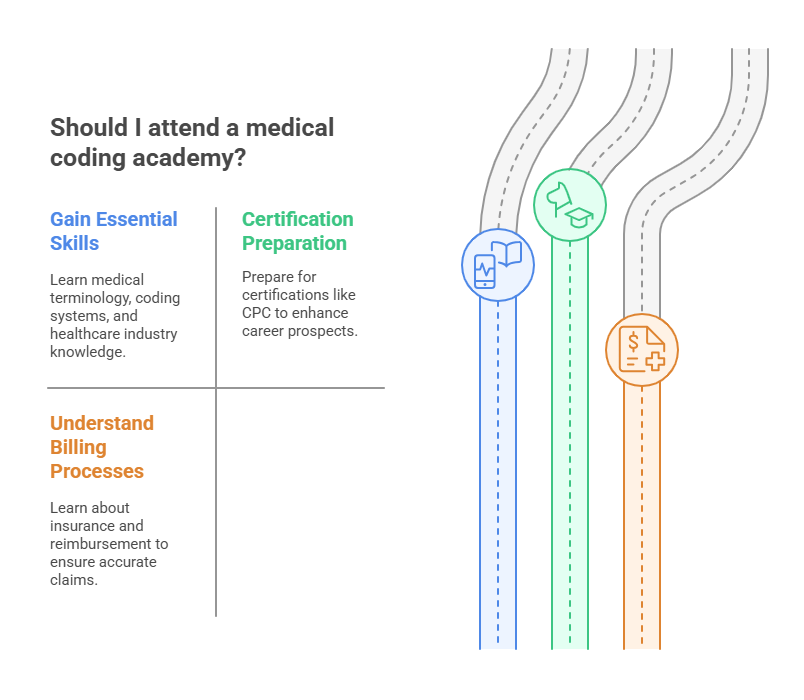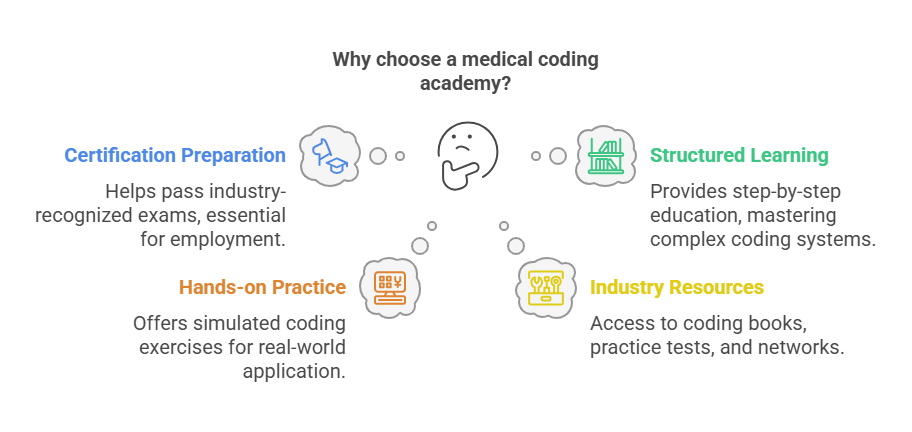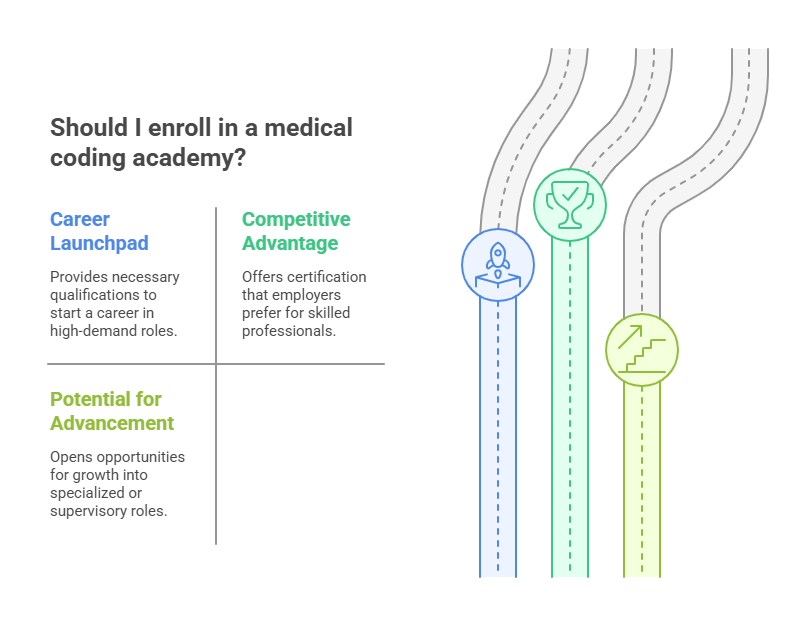Introduction to Medical Coding: What is a Medical Coding Academy?
Medical coding is a critical part of the healthcare industry. It’s a job that combines knowledge of healthcare procedures, medical terminology, and technical expertise. In this blog, we will delve into the world of medical coding, its importance in the healthcare system, and how enrolling in a medical coding academy can help you launch a successful career.
What is Medical Coding?
Medical coding is the process of transforming healthcare diagnoses, procedures, medical services, and equipment into universal medical alphanumeric codes. These codes are then used for billing, insurance claims, and record-keeping purposes. Medical coders play a crucial role in ensuring that healthcare providers are reimbursed correctly for the services they provide.
In the healthcare setting, the codes used to represent various medical conditions, treatments, and services are standardized. For example, in the United States, the ICD-10 (International Classification of Diseases, 10th edition) coding system is used to assign codes to various diagnoses, while the CPT (Current Procedural Terminology) codes are used for medical procedures. Medical coders use these systems to assign the correct codes to a patient’s diagnosis and the treatment they received, ensuring that the healthcare provider is paid accurately.
The accuracy of medical coding is essential because incorrect coding can lead to denied claims, delayed payments, and potential legal issues. Medical coders are tasked with understanding the nuances of medical procedures, patient information, and the ever-evolving coding systems to ensure precise documentation.
What is a Medical Coding Academy?
A medical coding academy is a specialized institution or training center that offers education and certification programs for individuals interested in becoming medical coders. These academies provide students with the essential skills and knowledge needed to succeed in the medical coding profession.
Medical coding academies typically offer programs that cover:
Medical terminology: Understanding the language of medicine is crucial for a coder. Courses teach students about anatomy, physiology, and medical terms that they will encounter on the job.
Coding systems: Students are trained in coding systems such as ICD-10, CPT, and HCPCS (Healthcare Common Procedure Coding System), which are vital for proper documentation and reimbursement.
Healthcare industry knowledge: Medical coders need to understand the healthcare environment, including how hospitals, insurance companies, and physicians interact.
Billing and reimbursement processes: Understanding the insurance process, payment structures, and billing practices is important to ensure that claims are processed accurately.
Most medical coding academies also provide certification preparation programs. Certifications, such as the Certified Professional Coder (CPC) credential from AAPC (American Academy of Professional Coders), are often required for medical coders to qualify for higher-paying positions and advancement opportunities.
Why is a Medical Coding Academy Important?
Choosing the right academy to learn medical coding is crucial for a successful career. Medical coding academies provide structured, accredited programs that teach students not only the technical aspects of coding but also how to apply this knowledge in real-world healthcare settings. Here's why a medical coding academy is important:
Professional Certification Preparation: The programs at these academies are often designed to help students pass certification exams, such as the CPC or Certified Coding Specialist (CCS) exams. These certifications are recognized by healthcare employers and are often required for employment.
Structured Learning Environment: Medical coding requires an understanding of complex coding systems and medical terms. A coding academy provides structured, step-by-step learning, allowing students to master each topic before moving on to the next.
Hands-on Practice: Many academies offer simulated coding exercises, allowing students to practice coding on actual medical records. This hands-on experience helps students develop the skills they need to succeed in the workplace.
Access to Industry Resources: A good medical coding academy provides access to valuable resources, such as coding books, practice tests, and access to industry networks. These resources are essential for a student’s success during the program and afterward in their career.
Networking Opportunities: Many academies host events, workshops, and career fairs where students can connect with potential employers. Networking with industry professionals can lead to internship and job opportunities.
How Does a Medical Coding Academy Help You Build a Successful Career?
Enrolling in a medical coding academy provides a clear path toward a rewarding career in the healthcare industry. Here’s how attending a medical coding academy can benefit you in your career:
1. Career Launchpad
Medical coding is an in-demand job, and completing a certification program gives you the necessary qualifications to start your career. Medical coding professionals are needed in hospitals, clinics, insurance companies, and government agencies. With the knowledge and skills gained at a medical coding academy, you’ll be well-equipped to secure a job.
2. Competitive Advantage
Earning a certification from a recognized medical coding academy gives you a competitive edge over other job applicants who may not have formal training or certification. Employers are more likely to hire certified professionals because they can trust that these individuals have the skills and expertise to perform the job correctly.
3. Potential for Advancement
Medical coding is not a static job; there is plenty of room for growth. With experience, you may move into more specialized coding roles (e.g., inpatient or outpatient coding) or supervisory positions, such as coding auditor or coding manager. Some individuals may even transition into related fields like medical billing, health information management, or compliance auditing.
What to Look for in a Medical Coding Academy
Choosing the right medical coding academy is a critical step in starting your career in the healthcare industry. With the increasing demand for skilled medical coders, enrolling in a well-established, reputable academy can provide you with the foundation needed for long-term success. However, with so many options available, how do you know which academy is right for you? To ensure that you receive the best education possible and are well-prepared for the challenges of the profession, there are several key factors to consider when selecting a medical coding academy. These factors will help guide your decision and ensure that you make an informed choice that aligns with your career goals.
Accreditation: Ensuring Industry Standards
One of the most important things to look for when choosing a medical coding academy is accreditation. Accreditation ensures that the program you are enrolling in meets the educational standards set by recognized industry organizations. It is a mark of quality that assures you the academy’s curriculum is up to date with industry practices and that the education you receive is recognized by employers in the healthcare field.
Two of the most respected accrediting organizations in the medical coding industry are the AAPC (American Academy of Professional Coders) and AHIMA (American Health Information Management Association). These organizations set strict standards for training and certification, and many employers require candidates to have graduated from an accredited academy.
By attending an accredited academy, you gain credibility in the job market, as employers often prefer candidates who have received training from institutions that adhere to recognized standards. Additionally, accreditation can make it easier to obtain professional certifications after graduation, which are essential for advancing in your medical coding career.
Curriculum: Comprehensive and Up-to-Date Content
A strong curriculum is one of the cornerstones of a successful medical coding education. When evaluating a medical coding academy, it’s important to ensure that the curriculum covers all the essential topics that are necessary for becoming a proficient medical coder. The curriculum should be comprehensive, current, and designed to provide you with the foundational knowledge and practical skills required in the field.
Some of the key areas that a solid medical coding program should cover include:
Medical Terminology: Understanding medical language is vital for interpreting diagnoses, treatments, and procedures.
Anatomy and Physiology: Basic knowledge of the human body is crucial for understanding how various conditions and treatments relate to one another.
Coding Systems (ICD-10, CPT, HCPCS): Learning the most commonly used coding systems in healthcare—ICD-10 (International Classification of Diseases), CPT (Current Procedural Terminology), and HCPCS (Healthcare Common Procedure Coding System)—is essential for accurate coding.
Billing and Reimbursement: Understanding how medical billing works, including insurance claims and the reimbursement process, is critical for medical coders.
Compliance and Ethics: Knowledge of healthcare laws and regulations, such as HIPAA (Health Insurance Portability and Accountability Act), is important for ensuring compliance and ethical practices.
Ensure that the academy provides a detailed syllabus that breaks down each subject and demonstrates how each topic is structured and delivered. Additionally, a good curriculum should incorporate hands-on experience with coding software, practice with real-life scenarios, and opportunities for interactive learning. By enrolling in a program with a well-rounded and up-to-date curriculum, you can ensure that you are fully prepared to meet the demands of the medical coding profession.
Instructor Expertise: Learning from Experienced Professionals
The quality of instruction you receive plays a pivotal role in your overall learning experience. When choosing a medical coding academy, it’s important to investigate the qualifications and experience of the instructors who will be teaching you. Ideally, instructors should be professionals who have extensive experience working in the field of medical coding and healthcare information management.
Experienced instructors can offer valuable real-world insights that go beyond textbook knowledge. They can provide practical examples from their own careers and help you understand the challenges and nuances of the profession. Additionally, instructors with industry experience can give you advice on best practices, tips for success, and guidance on career advancement.
When researching an academy, inquire about the instructors' credentials and professional background. Many respected academies employ instructors who hold certifications such as CPC (Certified Professional Coder) or CCS (Certified Coding Specialist) from recognized certification bodies like the AAPC or AHIMA. These certifications ensure that instructors have not only the knowledge but also the practical experience to teach medical coding effectively.
Job Placement Assistance: Support for Your Career Launch
One of the most valuable services that many medical coding academies offer is job placement assistance. Medical coding can be a competitive field, and securing your first job after graduation can sometimes be challenging without the right resources. Job placement assistance programs can be a game-changer in helping you make the transition from student to professional.
These services typically include job search support, resume writing workshops, interview preparation, and networking opportunities. Many academies have established partnerships with healthcare providers, insurance companies, and other employers in the healthcare sector. This means that students often have access to exclusive job listings and internship opportunities that are not available to the general public.
In addition to direct job placement support, some academies also offer networking events, career fairs, and alumni connections. Networking with professionals in the field can help you secure valuable job leads and build relationships that may lead to future job opportunities. Look for academies that have a strong track record of helping graduates land jobs, and consider speaking with alumni to gauge their experience with job placement services.
Flexible Learning Options: Convenience for Diverse Lifestyles
In today’s fast-paced world, many students require flexible learning options to balance their education with other commitments, such as work or family. Look for a medical coding academy that offers a variety of learning formats, including online learning, evening classes, or hybrid models that combine in-person and online education.
Online learning options are particularly important for students who need flexibility in their schedules. Many accredited medical coding programs offer fully online courses that allow you to study at your own pace, from the comfort of your home. This option can be especially appealing if you have a busy lifestyle or live in an area where in-person classes are not easily accessible.
When considering online learning, ensure that the academy offers comprehensive resources such as live online sessions, recorded lectures, interactive discussion boards, and access to coding software. Additionally, check if the online program provides opportunities for practical experience, as hands-on practice with coding software is essential to becoming proficient in the field.
Additional Support Services: Enhancing the Learning Experience
In addition to the core elements like accreditation, curriculum, instructor expertise, and job placement assistance, consider the extra support services offered by the academy. Some medical coding academies offer tutoring, mentorship programs, career coaching, or study groups to help students stay on track and overcome any academic challenges.
A good academy should provide a supportive learning environment where students feel encouraged and motivated to succeed. Check whether the academy offers resources such as access to coding practice exams, continuing education opportunities, and certification exam preparation to help you further develop your skills and stay updated with industry changes.
FAQs
-
A medical coder translates healthcare services, diagnoses, and procedures into alphanumeric codes used for billing, insurance claims, and record-keeping purposes.
-
While certification is not always required, most employers prefer candidates who have completed certification programs, such as the CPC or CCS. Certification can increase your chances of getting hired and earning a higher salary.
-
The length of the program depends on the academy, but most certification programs take between 6 months to a year to complete.
-
Yes, you can become a medical coder even if you don’t have a healthcare background. Most coding academies offer foundational courses in medical terminology and anatomy to help students without a healthcare background.
-
The average salary for a medical coder can vary depending on experience and location, but it typically ranges between $40,000 to $60,000 per year.
5 Lesser-Known Facts About Medical Coding
Medical coders can specialize in specific areas such as oncology coding or cardiology coding, allowing them to become experts in high-demand medical fields.
Medical coders are in high demand globally. With the rise of telemedicine and electronic health records (EHR), there’s an increasing need for coders to manage healthcare data.
Medical coding is crucial for healthcare data analytics. Coders contribute to the growing field of healthcare data analytics by ensuring accurate coding, which is essential for analyzing healthcare trends.
The role of a medical coder can be performed remotely. Many medical coding professionals enjoy the flexibility of working from home, as coding jobs are often offered as remote positions.
Coding can save healthcare providers money. Accurate coding ensures that healthcare providers are reimbursed properly, which directly impacts their financial health.
At AMBCI, we offer comprehensive medical coding and billing certification programs designed to prepare you for a successful career in the healthcare industry. Whether you are just starting your journey or looking to advance your skills, our programs provide the knowledge and resources you need to excel. Join us today and take the first step toward a rewarding career in medical coding!




